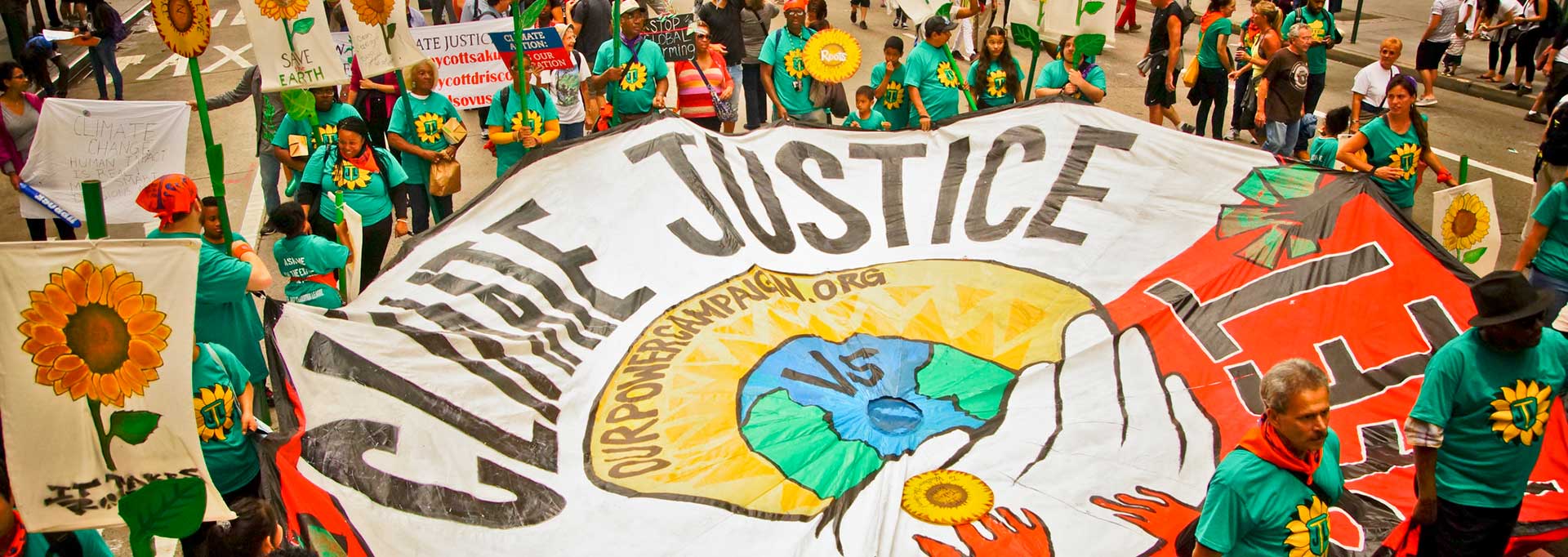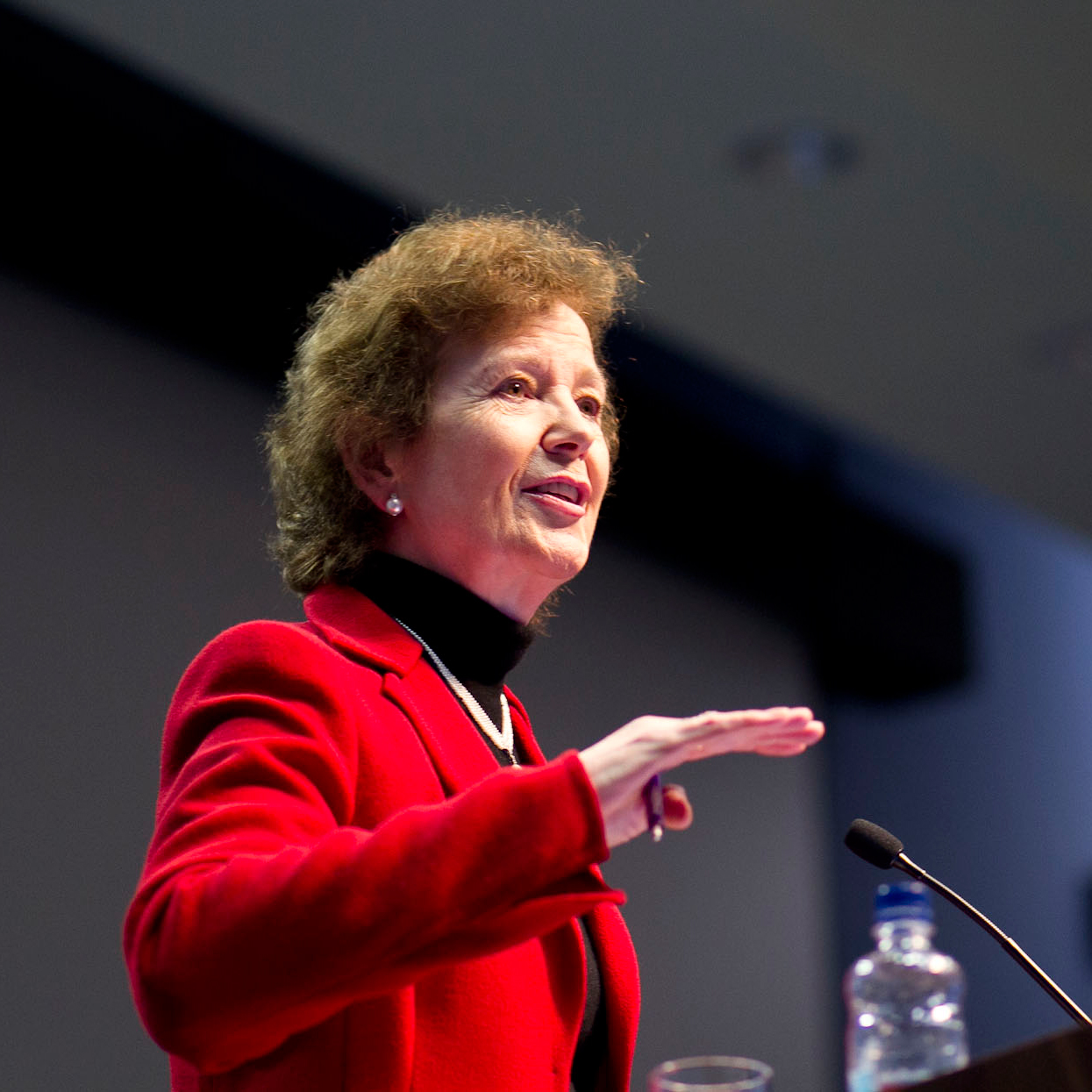Former Irish President Mary Robinson has been a powerful advocate for climate justice, including women’s perspectives and needs in the fight against climate change, for over a decade. In 2010 Mrs. Robinson set up The Mary Robinson Foundation – Climate Justice, a center for thought leadership, education, and advocacy in the struggle to secure global justice for the people most vulnerable to impacts of climate change.
Climate change has never been a gender-neutral issue, and the first step towards tackling its challenges is empowering women to safeguard the environment. In the interview below, President/CEO of Women Deliver Katja Iversen and Mary Robinson expand on this vision.

Iversen: We know that men and women are affected differently by climate change. But what is one of the most striking examples of ways women are affected, that you’ve witnessed? And what powerful ways you have you seen them deal with it?
Robinson: The impacts of climate change are multifaceted and exacerbate existing social inequalities. So for me there is not one stand out example of their impacts on women. Instead I would prefer to speak the courage and dignity of the women I have met who are struggling day in, day out, with the pervasive challenges that climate change impacts pose to their lives. Women in developing countries are particularly vulnerable to climate change because they are highly dependent on local resources and a healthy environment for their livelihood. In the face of a changing climate, women charged with securing water, food and fuel for cooking and heating must travel further and expose themselves to greater risk in order to provide for their family.
Women’s voices must be heard and their priorities supported to advance climate justice.
Many inspiring women are already leading as powerful agents of change in communities, countries and international agencies working on climate action, but they remain underrepresented in national and global decision-making. Women’s voices must be heard and their priorities supported to advance climate justice. I have seen many examples of the transformative role of women in enhancing community resilience to the impacts of climate change. One woman that springs to mind is Celia Reyes who I met during a visit to Chile in 2015. Her community had suffered as a result of persistent drought, with many forced to leave as their rural livelihoods became impossible due to soil degradation, water shortages and desertification.
But Celia was unwilling to leave the land where she was born and so she began working within her community to improve their circumstances. Her participation in a neighborhood organisation enabled Celia to help tailor the development of a rainwater harvesting system which has brought about life-altering benefits for the impacted households and now Celia is able to grow fruits and vegetables on land that was rendered useless by the drought. Celia has since taken part in regional and even national dialogues, helping decision makers in Chile to understand the realities of climate change for impacted communities and highlighting that these impacts are not gender neutral. We need more of this!

Recently, the global community seems to have realized that women’s participation in climate negotiations is key to making progress. But what does “meaningful participation” really mean? How have you personally managed to get diverse voices represented and talking to one another?
In the climate change process, meaningful participation simply means that women’s knowledge and experiences are listened to and understood so that the climate actions are designed that are responsive to women’s needs as well as men. It is simply a matter of prioritising and adopting intentional, targeted approaches to overcome the inequalities in participation that we face.
It is imperative that advocates for women’s participation and gender equality reach those decision makers who do not understand the relevance of gender to their work. Champions of gender equality know that without concerted efforts to include women in the design, implementation and monitoring of climate policy, the global response to climate change will fail to unleash the full potential of women to be agents of change and thus make achieving the targets set out in the Paris Agreement all the more challenging. But we cannot spend our time in echo chambers with other champions who share our opinions. Change will come when we reach those for whom the inclusion of gender considerations is a confusing issue – those who perhaps see gender as an unnecessary complication in driving forward technocratic solutions to climate change.
In 2013, my Foundation worked with the Irish Government, who at the time held the European Presidency, to organise an international conference called Hunger-Nutrition-Climate Justice. In designing the conference, we wanted to turn the tables and have the policy makers present listen to those living and working on the front lines of climate change. So one third of the conference participants were grassroots practitioners. They were the experts and they were given the platform to share their knowledge and expertise. We also ensured that half of the conference participants were women.
More recently, my Foundation supported the participation of two grassroots women at the climate change negotiations in Bonn in this past May. The women, Rosemary Wambua from Kenya and Josephine Castillo from the Philippines, engaged in a mandated workshop on gender-responsive climate policy, and spoke of the work they are doing at home to build resilience in their communities. I was glad that the new decision on gender and climate change, adopted at COP 22 in Marrakech, recognises the important contribution grassroots women can make to the development of effective and gender-responsive climate action and calls on parties to integrate local and traditional knowledge in the formulation of climate policy.
By listening to the realities of people, especially women, with lived experience of climate change and their experiences of both the problems and the solutions that work, policy makers and political leaders were provided with critical evidence to make post-2015 policy development more relevant, responsive and effective.
I want to emphasise very strongly how important it is that we have women’s leadership on climate change and I mean women’s leadership at all levels.
Participation in decision-making and policy talks is important, but only one piece of the puzzle. What technical skills should women be learning in order to make an immediate impact on their livelihoods and a long-term impact on the earth?
Education and capacity building will be central for all people in order to help drive the great transition we must make to a zero carbon future in which all people can realise their right to development. This is particularly true for women because, in many cultures, women are key actors in driving behavioural change at the household level.
Saving the planet for present and future generations will require us to change how and what we cook, the way we heat our homes, what we wear and the products we consume. Context specific education must be available to help communities understand the need for change and to drive sustainable lifestyles. For women, training must be available that enables them to fully participate in the transition to low carbon technologies and sustainable livelihoods.
However, the process of educating and building capacity is not a one way street. Decision makers must be trained to understand the needs of communities and women in particular. If community representatives or women’s representatives do not speak the technical language of a given decision making process, be it at local, national or international level, the onus is on the decision makers to understand regardless. Livelihoods and contexts differ – there cannot be a one size fits all approach if we are to enable truly gender responsive sustainable development. Those in positions of power must be able to understand what they are hearing from communities and be able to interpret the implications for the strategies they are charged with designing.
This is the responsibility of everyone – from the top scientists and climatologists working on the reports of the Intergovernmental Panel on Climate Change, to the implementations of local projects in communities around the world.
There isn’t a lot of data about how climate change impacts women. Who is responsible for collecting that data? How do we start?
It is widely recognised that current data on gender and climate change is totally inadequate. This is not an issue that is unique to the climate process. It holds true across all areas of the 2030 Agenda for Sustainable Development also. Having robust, gender-disaggregated data collection not only facilitates the design of gender responsive policies, it also aids transparency and accountability – it helps to measure and monitor progress and adjust when we know what works and what doesn’t.
This is the responsibility of everyone – from the top scientists and climatologists working on the reports of the Intergovernmental Panel on Climate Change, to the implementations of local projects in communities around the world. We must document what we are doing and quantify the progress being made. Accurate data will help to share experiences and develop models of best practice. Ensuring the quality, availability and use of gender related data will have a significant, tangible impact on the lives of millions of women and girls throughout the world.
Lets talk about progress and the future we hope for. What kind of jobs will a clean economy offer, specifically to women? And what governments and businesses are leading the way
By embracing a transition to a zero carbon future, we can unleash a green economy that could dwarf the growth fuelled by the industrial revolution. There would be innumerable jobs in sectors such as renewable energies, recycling, clean transport, and energy efficiency in buildings. But in order for this to be a successful transition, it must be a fair transition.
This means that all people are able to benefit from technological and economic advances, and that the transition is underpinned with a respect for human rights and a commitment to the empowerment of women. Without this, those left behind will continue to exploit fossil fuels to power their development and the associated emissions will ultimately render the transition futile.
I don’t think I have yet seen a country with significant historical emissions, or a large business, that I can point to and say “they get the urgency of the action required – they are demonstrating the ambition necessary to keep warming close to 1.5oC”. To ensure a just transition, countries and businesses should be developing robust action plans that provide a roadmap for the rapid reduction of emissions. These reductions should be on a timeline commensurate with what is required to stabilise warming as close to 1.5oC above pre-industrial levels as possible. These plans should be developed in consultation with citizens and workers and then disseminated widely, with provisions in place to help retrain and reskill those whose livelihoods are put at risk by the shift away from fossil fuels. Climate change is perhaps the greatest threat facing the global community today. The Paris Agreement was a great achievement, but it was only the starting point – now is the time for action and for world leaders must deliver on the promises they made in Paris last December.
Mary Robinson is President of the Foundation and Chair of the Board of Trustees. She is a former President of Ireland (1990-1997) and a former UN High Commissioner for Human Rights (1997-2002).
